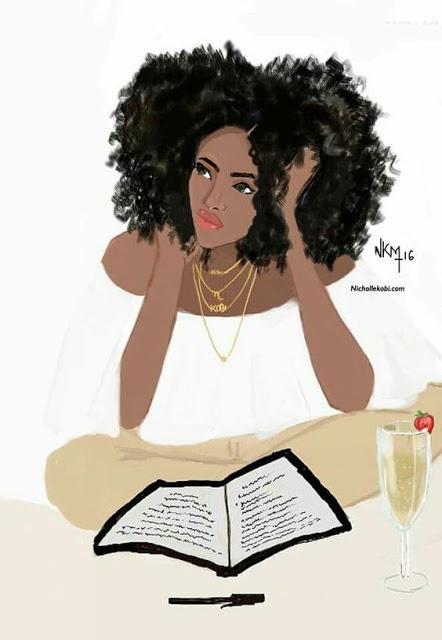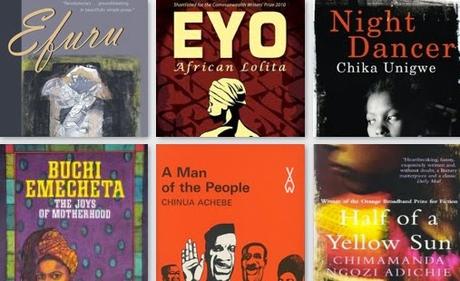
Art by Nicholle Kobi. Source: Pinterest
It was quite hard to write this post as I’m getting a little personal, but only a little. This month (March) makes exactly two years since I finally said bye bye bye to my PhD. In that time I still stick to a few things:
1. The PhD is damn hard. 2. I am stronger than I think. 3. I am so glad I never have to do it ever again.
Well, after almost two years of ignoring my PhD monograph, at the beginning of the year I decided I was actually going to pick up my thesis and begin thinking about doing something with it. First I wanted to pay homage to the role Nigerian fiction played in my thesis. A teeny background before I begin. My thesis looked at the everyday lives of male and female domestic workers in Lagos – a labor force that, while somewhat ‘hidden’ in public policy terms, is a significant part of daily life in Nigeria. These women and men perform different jobs, such as caring for children, keeping homes (and surrounding compounds) neat and tidy, washing clothes and/or dishes, driving people around, and keeping homes safe and secure. Yet, they often remain invisible in Nigerian society, and in most cases are treated with very little respect and dignity, and face multiple and varied forms of abuse and discrimination. In my thesis, I was interested in understanding the terrain of struggle and negotiation in the places people work, live and move through on a daily basis – particularly in a context such as domestic work, where unequal power relationships are deeply embedded within these everyday situations. I was also interested in how these experiences are shaped by factors such as gender, age, occupation, living conditions (living with employer or not) and so on.
Now that's out of the way .... When I first started working on my PhD, one of the things I found frustrating (and trust me, there were many) was that while (as mentioned earlier) domestic work was an important part of daily life in Nigeria, I really struggled initially to find information surrounding details of the employment in the country - even in terms of numbers. With time I did find some papers and texts on the subject and my interviews greatly helped, but it was tough in the beginning.
On many occasions when I was frustrated with my PhD, or just felt like giving up I would turn to fiction – as a way to escape from the stress of the thesis. If I’m honest, it was also a way to procrastinate and ignore it all together. I never even intended (or thought it was possible) for fiction to play a role in my PhD, but what it ended up doing more than anything was giving me the confidence to continue writing about a topic I felt needed to be researched. It also made me realize that while I had to follow certain rules and regulations regarding how a PhD is written, I could also write it in a way that was not too rigid. A way that enabled me to tell a story – because ultimately I was telling a story of the lives of men and women who worked, and sometimes lived, in the homes of middle- to upper-class Nigerians.
While I did not read these novels as the bearer of truths for all things on domestic work in Nigeria, it was just great for someone like me who was arguing about the somewhat invisibility of domestic workers in Nigerian public policy to see that fiction writers had taken the time to write about domestic workers in some shape and form. There was Chinua Achebe’s (1966) A Man of the People, which portrayed African men in the kitchens of the missionaries or other colonists as cooks and stewards, as well as Buchi Emecheta’s (1994) The Joys of Motherhood, where the father of the female protagonist, Nnu Ego, sends her to Lagos to marry a man, Nnaife, who earns a living as a ‘washerman’ for an English family.
 Then there was Flora Nwapa’s (1966)
Efuru, a novel about an independent, but ‘cursed’ woman living in a village in
colonial Nigeria. I remember reading it
back in 2013 and getting to the section where Efuru asks her mother-in-law to
help her get a maid to help her look after her baby. Her mother-in-law found
her a ten-year-old girl, who was the daughter of her mother-in law's cousin:
Then there was Flora Nwapa’s (1966)
Efuru, a novel about an independent, but ‘cursed’ woman living in a village in
colonial Nigeria. I remember reading it
back in 2013 and getting to the section where Efuru asks her mother-in-law to
help her get a maid to help her look after her baby. Her mother-in-law found
her a ten-year-old girl, who was the daughter of her mother-in law's cousin:
‘What bothers me now is a maid. I want a maid to help me look after Ogonim while I trade with my husband.’ ‘A maid? You want a maid to look after your only child? She will kill her. I advise you not to have a maid. You will regret it.’ ‘I shall get a good one. I want to help my husband. We have been losing much money.’ ‘What is that to you? What is money? Can a bag of money go for an errand for you? Can a bag of money look after you in your old age? Can a bag of money mourn you when you are dead? A child is more valuable than money. So our fathers said.’ As if these were not enough, Efuru’s friend began to narrate all the atrocities of maids. ‘You know Nwanta, don’t you?’ ‘Yes.’ ‘You know that her first son is blind in one eye.’ ‘Yes.’ ‘A maid was responsible for it.’ ‘How?’ Efuru asked in horror. ‘The boy was playing with a stick. The maid saw him and did not take it away from him. So the stick went right into his eye and now the poor boy is blind in one eye.’ ‘You know Nwanyuzo, don’t you?’ ‘Yes, I know here very well.’ ‘You know that her daughter has a burnt face. And I don’t know who is going to marry a girl with a burnt face. It was a maid who was responsible for it too.’ Efuru did not ask her how that happened this time. It was not necessary. ‘I have maids no doubt, but I know how to treat them with an iron hand. I do.’
I also read about domestic workers in contemporary Nigerian novels, such as Chimamanda Ngozi Adiche’s (2006) Half of A Yellow Sun through Ugwu - Odenigbo's 'houseboy', Abidemi Sanusi’s Eyo (2009) where a young girl is trafficked to the UK, where she initially works as a domestic servant, and Chika Unigwe’s (2012) The Night Dancer, where Ezi's husband has an affair with their young maid, Rapu. Short stories also did not disappoint, such as Life During Wartime: Sierra Leone, 1997 by Chimamanda Ngozi Adichie published in 2006 in The New Yorker online, where Adichie writes about Fide – a ‘houseboy’ from the village, who is described as ‘backwards’ because he had never seen a refrigerator and spoke a rural dialect of Igbo that was not Anglicised. He chewed rice with his mouth open, washed his employer’s clothes in metal basins, and hung them on the line tied from the mango to the guava tree in the back yard. There was also the short story, The Housegirl by Okey Chigbo in Chinua Achebe and C.L, Innes’ Contemporary African Short Stories.
I even read about domestic workers in places I least expected – it was like subconsciously I was looking for it everywhere. I once randomly found a collection of stories by Steen Marcusson on his life as an expatriate in post-colonial West Africa with an excerpt on Hausa ‘maiguards’ (security guards). In one section, Marcusson (2003) writes:
‘How did the numerous thieves get into the store? Easy enough. 'The two devious night-watch-men were the ring leaders of the thieves!'It was clear to a blindman that our problem was an “insider” job or more correctly “insiders”. You never spotted signs of break-ins or forced entry … My first initiative was to replace the two Yoruba night-watch-men with 4 huge and powerful Hausa men. Hausas from the North are big, often 6’6” and more, and strongly committed Muslims. Hausa security guards from Kano were the right answer to security in “Yorubaland”. With Hausa night-watch-men any possibility of collusion was blanked out.’
I also read beyond Nigeria, such as Ferdinand Oyono’s (1990) Houseboy, and there was also Amma Darko’s The Housemaid, but in these works of fiction I found a space to begin to tell the story about domestic work that I really believed needed to be told.
Fiction also enabled me to improve my skills in writing, find my voice, and write my PhD in a way that was comfortable for me and true to who I was, as well as the women and men I interviewed (without losing all the academic rigour and so on that was necessary). Really, it gave me the confidence to own my PhD topic and realize that (to some extent) I can be in control of it, instead of my supervisor. And l like I said earlier, it offered me a space to escape from the hardship of the thesis when I needed it the most.
Blogging also helped me write my dissertation – and one day I may write about that. For now, this is a little thank you to fiction from me and my dissertation. Now, I’m off to find new inspiration and motivation to actually turn into it something beyond a PhD monograph. Wish me luck!

